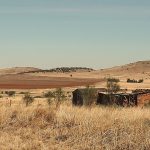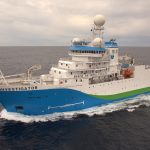 December 3, 2018 3:48 pm
Published by Climate Extremes
December 3, 2018 3:48 pm
Published by Climate Extremes
The Heatwaves and Cold Air Outbreaks Research program has been very active, producing a considerable number of papers over the past four months.
 November 30, 2018 12:57 pm
Published by Climate Extremes
November 30, 2018 12:57 pm
Published by Climate Extremes
It has been a very active time for the Climate Variability and Teleconnections Research Program in terms of research and engagement activities right across the team, including two expeditions - one drilling coral cores in the tropics and another going south to the Antarctic Circumpolar Current.
 November 30, 2018 11:01 am
Published by Climate Extremes
November 30, 2018 11:01 am
Published by Climate Extremes
The Drought program has been strongly focused on evaluating and improving climate models, and developing a drought database for documenting drought and for benchmarking model performance.
 November 29, 2018 11:00 am
Published by Climate Extremes
November 29, 2018 11:00 am
Published by Climate Extremes
CLEX PhD student Earl Duran presented his work on the South Australian Current System at ACOMO 2018 held this year at the Shine Dome, Canberra, ACT.
 November 27, 2018 4:07 pm
Published by Climate Extremes
November 27, 2018 4:07 pm
Published by Climate Extremes
The RV Investigator returned to Hobart after a 32-day voyage to map a meander of the Antarctic Circumpolar Current (ACC) Polar Front. Onboard were 11 CLEX students and postdocs; three international students; a film maker and visual artist; and collaborators from CSIRO, Antarctic Climate and Ecosystems Cooperative Research Centre, and Woods Hole Oceanographic Institution.
 November 27, 2018 11:45 am
Published by Climate Extremes
November 27, 2018 11:45 am
Published by Climate Extremes
James Goldie has created the Collateral package to ease the pain of debugging. You can repeat a potentially risky operation—building a statistical model, rendering a plot, computing a tricky index—on as many groups of data as you want, and collateral will quickly show you which groups ended with errors, which ones returned results, and which ones finished but printed warnings or other messages.
 November 27, 2018 11:13 am
Published by Climate Extremes
November 27, 2018 11:13 am
Published by Climate Extremes
It is February of 2032, and Canberra is living and breathing a warmed climate. Temperatures have climbed above 40 °C. Drought across south-east Australia has drained Canberra’s water supply, while bushfires burn the neighbouring national parks. This was the hypothetical scenario given to 40 or so young professionals from a range of professional backgrounds (defence, engineering, finance, state/federal government, academia, medicine) who attended the Earth Systems and Climate Change (ESCC) Hub’s latest Young Professional event.
 October 5, 2018 2:15 pm
Published by Climate Extremes
October 5, 2018 2:15 pm
Published by Climate Extremes
The Extreme Rainfall Research Program of the Centre of Excellence for Climate Extremes (CLEX) held a workshop on October 4 at the University of New South Wales (Sydney). There were 30 participants representing the CLEX nodes, Bureau of Meteorology, CSIRO, NSW Office of Environment and Heritage and National Centre for Atmospheric Research.








